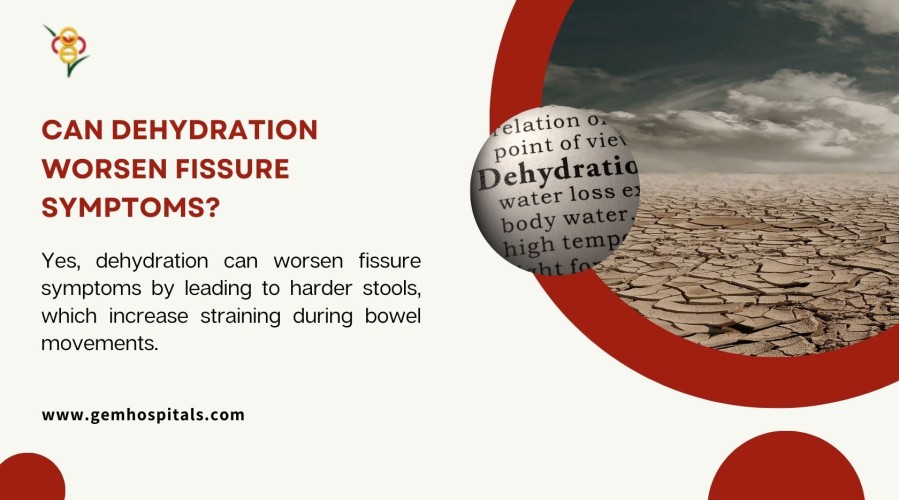Learn what gallstones are, their common symptoms, causes, and treatment options. Discover when to seek medical care and how to manage gallstone complications effectively.
Can dehydration worsen fissure symptoms?

Generally, the anal fissures are going to be a painful journey this is because of the tears in the lining of the anal canal most probably it is due to the result of trauma from passing hard stools. Even the small cracks in the anal canal going to cause great discomfort each time while the bowel movement along with the discomfort an individual may also experience bleeding, itching, and even spasms in the anal sphincter muscles. Certain factors have the greater contribution towards the development and persistence of anal fissures, one among them is dehydration they not only contribute to their development they worsen the fissure symptoms. From the below article, you can get to know how dehydration affects anal fissures and why maintaining proper hydration is essential check it out.
Understanding anal fissures
Anal fissures develop due to trauma or injury to the thin, sensitive lining of the anus. This often occurs when hard stools pass through the rectum, stretching the tissue and causing a tear. Fissures are commonly associated with chronic constipation, straining during bowel movements, and prolonged sitting. There are two main types of fissures, acute and chronic anal fissures.
The symptoms of anal fissures include severe pain during and after bowel movements, bright red blood on the stool or toilet paper, and a visible tear near the anus. Many patients also experience spasms in the anal sphincter, which can further aggravate the condition.
The role of hydration in digestive health
Hydration is essential for maintaining a healthy digestive system. Water helps in the proper digestion and absorption of food, facilitates the smooth movement of waste through the intestines, and prevents constipation by keeping stools soft. When the body is well-hydrated, the large intestine absorbs less water from the waste material, resulting in stools that are softer and easier to pass.
Dehydration, on the other hand, has the opposite effect. When the body does not receive enough water, the colon absorbs excess water from the stools, making them hard, dry, and difficult to pass. This can lead to constipation, straining during bowel movements, and an increased risk of developing anal fissures.
How does dehydration worsen fissure symptoms?
Dehydration can significantly worsen the symptoms of anal fissures in several ways, making it harder for the fissure to heal and increasing the likelihood of re-injury. Below are some of the mechanisms by which dehydration exacerbates fissure symptoms,
- One of the primary ways dehydration worsens fissures is by contributing to the hardening of stools. Without adequate water intake, the colon absorbs more water from the waste passing through the digestive system, resulting in harder stools that are difficult to pass. When these hard stools move through the rectum, they can scrape against the sensitive tissue in the anal canal, aggravating existing fissures and causing re-tears. Patients with anal fissures often experience intense pain during bowel movements, which is further amplified by the passage of hard stools.
- Dehydration also contributes to increased straining during bowel movements, another factor that worsens fissure symptoms. When stools are hard and dry, more effort is required to pass them. This excessive straining puts pressure on the anal sphincter, stretching the tissue and increasing the likelihood of re-tearing the fissure.
- Proper hydration is crucial for overall tissue health and repair. Water plays a key role in maintaining blood volume, circulation, and oxygen delivery to tissues throughout the body. When the body is dehydrated, blood volume decreases, and circulation to peripheral areas, such as the anal region, may be compromised. This can lead to reduced blood flow to the site of the fissure, which is essential for healing.
- Hydrating yourself is vital to maintain the balance of the body’s function in that case while you are already experiencing anal fissure it is highly necessary. The dehydration worsens the fissure symptoms. Ensuring a sufficient intake of water, consuming hydrating foods, and using stool softeners when necessary can help keep stools soft, reduce straining, and promote faster healing of fissures.
Conclusion
Therefore, it is correct that dehydration can make the fissure worse because it leads to formation of harder stools and increased pressure during defecation. Drinking plenty of water is beneficial in softening the stools, reducing the inflammation, and aiding the healing process of the fissures, which are the reasons why hydration is a key component in the management of fissures.
If the fissure symptoms are persistent, one should consult a professional health care provider. Visit Gem Hospital today for an appointment and get the best treatment plan that will help to reduce your discomfort.
Blogs & Article
Learn about bloating and gas problems, including common causes, symptoms, and effective solutions to improve digestion, reduce discomfort, and maintain gut health.
Learn how unverified Ayurveda treatments may cause liver damage, understand the risks, symptoms, and why medical guidance is essential for safe care.


